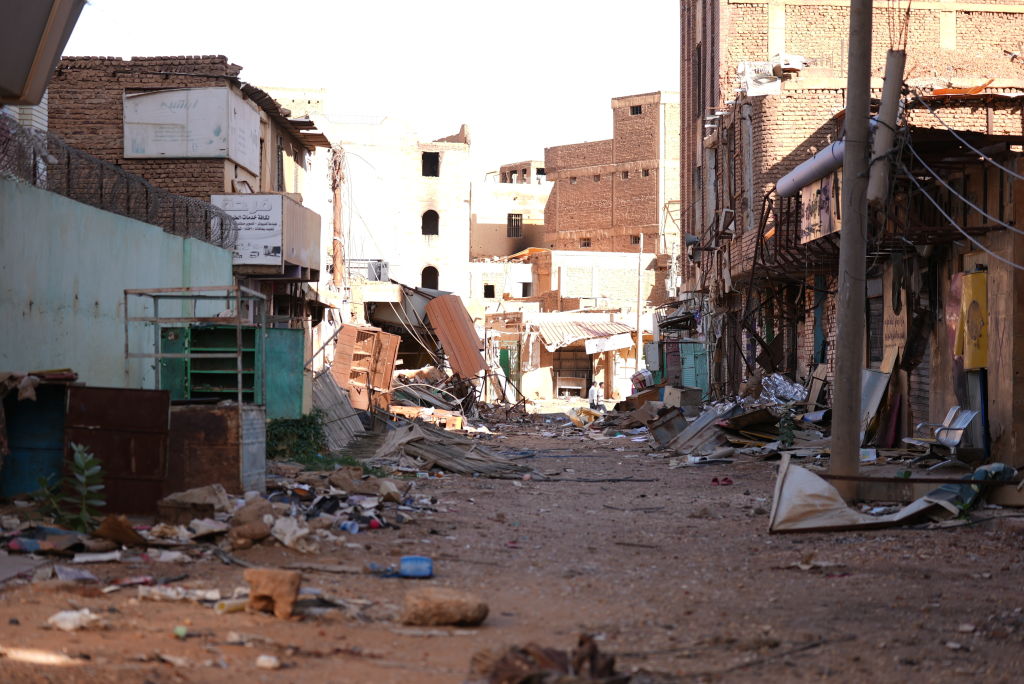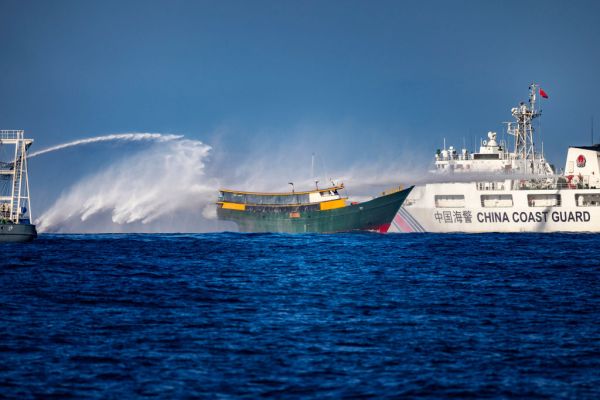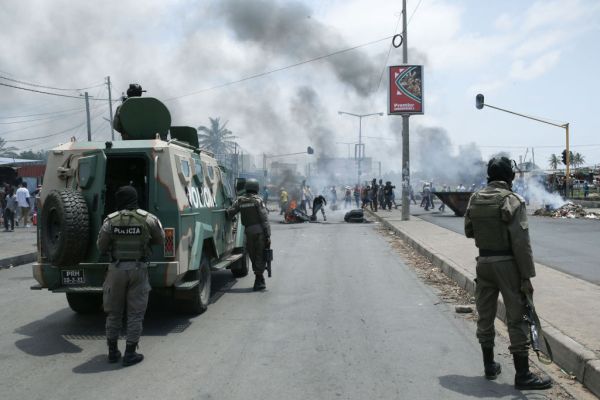Happy Wednesday! As the Supreme Court considers whether to uphold a “TikTok ban” set to take effect on Sunday, the app’s users have begun to flock to an alternative Chinese streaming platform: Xiaohongshu. The U.S. government is seeking to outlaw TikTok over its alleged ties to the Chinese Communist Party, but rest assured, Xiaohongshu—which translates to … checks notes … “Little Red Book”—is totally above board.
Quick Hits: Today’s Top Stories
- The Department of Justice on Tuesday released special counsel Jack Smith’s 137-page report on his investigation into President-elect Donald Trump’s efforts to overturn the 2020 election, in which Smith concluded that the incoming president had engaged in an “unprecedented criminal effort” to subvert the transfer of power. The report, which was made public following legal efforts by Trump to suppress it, outlined Smith’s belief that the president-elect would have been convicted in the election case had it not been for his success in the 2024 election. “Indeed, but for Mr. Trump’s election and imminent return to the presidency, the office assessed that the admissible evidence was sufficient to obtain and sustain a conviction at trial,” Smith wrote in conclusion. Trump responded to the findings Tuesday, asserting that he was “totally innocent” and calling Smith a “lamebrain prosecutor.”
- South Korean authorities detained President Yoon Suk Yeol on Wednesday in connection to his short-lived declaration of martial law last month, marking the first time in the country’s history that a sitting president has faced arrest. Yoon’s detention, on charges of abuse of authority and orchestrating a rebellion, followed an unsuccessful attempt by law enforcement to arrest him after an hourslong standoff between police and the president’s private security detail earlier this month. In a video address, Yoon denounced the investigation as “illegal” but said he would comply “in order to prevent any unsavory bloodshed.”
- Mozambique swore in Daniel Chapo—a member of the southern African nation’s longtime ruling party, the Mozambique Liberation Front—as president on Wednesday. The inauguration followed widespread unrest in response to the country’s October election, which opposition leaders and election monitors rejected as rigged in Chapo’s favor. “We’ll protest every single day,” the runner-up candidate, Venâncio Mondlane, said ahead of the swearing-in. “If it means paralyzing the country for the entire term, we will paralyze it for the entire term.”
- Pete Hegseth, President-elect Trump’s pick for defense secretary, appeared before the Senate Armed Services Committee on Tuesday for his confirmation hearing. After four hours of questioning about his treatment of women, alleged alcohol abuse, and qualifications, Hegseth appeared on track to advance through the committee. The full Senate could vote as soon as this week on whether to confirm Hegseth, whose odds improved after Sen. Joni Ernst of Iowa, previously considered a potential Republican holdout, told a Des Moines radio station on Tuesday that she would support him. The nominee can afford to lose the votes of only three Republicans.
- Wildfires continued to spread in and around Los Angeles on Tuesday, covering more than 37,000 acres. Firefighters successfully extinguished several smaller blazes, but officials warned the Palisades and Eaton fires—now 18 percent and 35 percent contained, respectively—could take weeks to bring under control. After dropping its “Particularly Dangerous Situation” red flag warning on Tuesday amid lower-than-expected winds, the National Weather Service reinstated the designation for parts of Los Angeles and Ventura counties through 6 p.m. PT today. At least 25 people have been killed, and more than 100,000 remain displaced, as a result of the ongoing natural disaster.
- The Department of Homeland Security announced plans on Tuesday to ban imports from 37 Chinese companies it accused of benefiting from forced labor in Xinjiang. The move—which included textile manufacturers, real estate firms, and mining subsidiaries—drew on the 2021 Uyghur Forced Labor Prevention Act, a law aimed at preventing goods made with forced labor in China, particularly in Xinjiang, from entering the United States. Tuesday’s announcement marked the largest round of companies outlawed under the authority in a single day.
Civil War in Sudan

On September 9, 2004, then-Secretary of State Colin Powell appeared before the Senate Foreign Relations Committee to deliver much-anticipated testimony on the crisis in Sudan’s western region of Darfur. Eighteen minutes into his remarks, he became the first executive branch official in U.S. history to declare an ongoing conflict a “genocide.”
More than 20 years later, American officials are once again warning that a campaign of ethnic destruction has gripped Sudan.
Secretary of State Antony Blinken formally declared last week that the Rapid Support Forces (RSF), a successor group to the Janjaweed militias behind the 2004 atrocities, has committed genocide in the country’s ongoing civil war. “The RSF and allied militias have systematically murdered men and boys—even infants—on an ethnic basis, and deliberately targeted women and girls from certain ethnic groups for rape and other forms of brutal sexual violence,” Blinken said in a statement last Tuesday announcing the determination.
More than 20 months into the civil war, the declaration marked a last-minute push by the Biden administration to bring peace to Sudan despite multiple failed attempts at mediation. But some lawmakers and former officials see the lame-duck effort—coming just days before President Joe Biden leaves office—as too little, too late, particularly as the country’s worsening famine threatens millions of lives.
Blinken’s announcement included accompanying U.S. sanctions against RSF leader Mohamed Hamdan “Hemedti” Dagalo and seven RSF-owned companies operating in the United Arab Emirates, one of the group’s primary international backers. But the administration’s policy toward Sudan thus far has done little to stymie the war between the RSF and the Sudanese Armed Forces (SAF), led by Gen. Abdel Fattah al-Burhan. When we last wrote to you about the conflict in August, the battle zones were relatively stable, with the SAF controlling much of northeastern Sudan and the coastline along the Red Sea and the RSF holding territory in the country’s southwest, including the region of Darfur.
But throughout the fall, the SAF launched several new offensives in eastern Sudan and around its contested capital of Khartoum, as the end of the rainy season made roads more navigable. The army gained ground in the capital and neighboring Omdurman. Over the weekend, one of the eastern offensives culminated in the SAF retaking the central city of Wad Madani—a key crossroads and the capital of the El Gezira state, the breadbasket region of the country. The takeover marked the biggest victory for the SAF in the war and could prove to be a tipping point in the conflict.
“Retaking the city of Madani is significant, both strategically, but also psychologically, for the army and for the people of Sudan,” Cameron Hudson—a former chief of staff to successive special envoys to Sudan and a current senior fellow in the Africa Program at the Center for Strategic and International Studies—told TMD. “That said, there have been multiple switches of momentum in the course of the war.” The RSF remains a highly mobile force, with the ability to outmaneuver the SAF, and it continues to control most of Darfur with its allied Arab militias. As in 2004, the region has witnessed widespread ethnically motivated violence directed at indigenous black communities like the Masalit.
As early as September 2023, media reports based on more than 100 eyewitness accounts, video footage, and satellite imagery clearly documented the atrocities the RSF had committed in the Geneina, the capital city of West Darfur. A subsequent U.N. report presented to the Security Council in January 2024 determined that between 10,000 and 15,000 people had been killed in Geneina in 2023. The report noted that young men fleeing the violence were asked about their ethnicity at RSF checkpoints and “if identified as Masalit, many were summarily executed with a shot to the head.”
Nearly 30,000 people have been killed in the conflict, but the reported numbers are likely a severe undercount. More than eight months ago, Tom Perriello—the U.S. special envoy for Sudan, a post he assumed in February 2024—estimated that the true number could be closer to 150,000. The U.N. Human Rights Council has documented hundreds of cases of sexual violence against women, including gang rape, concluding in an October report that the reported instances represent only “the tip of the iceberg.”
Amid the ongoing atrocities, the timing of Blinken’s genocide designation frustrated some lawmakers and lawmakers, who have been sounding the alarm on Sudan for more than a year.
“The Biden Administration waited until its last 13 days in office to label atrocities in Darfur as a genocide and to sanction the RSF and Hemedti,” Sen. Jim Risch, an Idaho Republican who chairs the Senate Foreign Relations Committee said in a statement last week. “The administration’s neglect and reticence to take meaningful action regarding one of the world’s worst conflicts has undoubtedly hurt America’s standing across Africa and the world.” Risch and a bipartisan group of his colleagues introduced a resolution in February 2024 recognizing the RSF’s actions in Darfur as genocide—and a similar resolution was introduced in the House last June.
Hudson, meanwhile, described the administration’s announcement as a “last-ditch effort to burnish their credentials on Sudan,” arguing it arrived too late to effectively pressure the belligerents in the conflict. “If they actually had concern for Sudan, this would have been used a year ago,” he said. “They would have used it for maximum leverage, and it would have been part of an overall strategic plan for Sudan.”
But Perriello defended the delayed declaration, saying it required a “careful review of the facts and the law” to determine genocidal intent. These designations typically require an extensive amount of research and fact-finding, and secretaries of state typically explain the supporting evidence behind their declarations. The fact-finding efforts that preceded the 2004 Darfur designation included interviewing more than 1,000 people affected by the violence, Powell said at the time.
When Blinken accused the Burmese military of perpetrating genocide against the Rohingya in 2022, he likewise laid out the evidence informing his decision, drawing on the findings of human rights groups as well as the State Department’s own investigation. But when announcing the Sudan designation, Blinken made no reference to new evidence or State Department reports that prompted his decision now instead of earlier. He only cited the continued RSF attacks and his December 2023 assessment that the paramilitary had committed crimes against humanity and ethnic cleansing.
And time is of the essence, as Sudan faces the looming prospect of mass casualties from starvation. Both the RSF and the SAF have brought Sudan to the point of famine in what appears to be part of their war strategies. Hemedti’s forces have actively destroyed food stores and farmlands in raids throughout the territory they control, and the army has blocked international organizations from importing and distributing food aid.
The Integrated Phase Classification (IPC) system, a U.N.-sanctioned initiative for assessing food insecurity across five phases, concluded in a December report that half of the country, 25 million people, face high levels of acute hunger, 8 million are experiencing emergency conditions characterized by “very high acute malnutrition and excess mortality,” and 637,000 people are in phase five: catastrophic famine conditions. The IPC confirmed famine in five parts of the country and projected an additional five areas would fall into famine by May.
Based just on their findings covering parts of North Darfur, officials estimated last August that 100 people die each day from starvation. The IPC doesn’t project future casualties, but famine researchers argue that the agency’s data portends hundreds of thousands of deaths from starvation. And a November report by Timmo Gaasbeek—a food security researcher based in the Netherlands, who previously lived and worked in Sudan—paints an even bleaker picture, estimating that up to 6 million people could die within the next year.
Part of the problem stems from the duration of the crisis since even people who have access to some amount of food cannot survive indefinitely at reduced levels of nutrition. “With a food intake deficit, energy intake deficit that’s more than a third, ultimately your body will not be able to deal with it,” Gaasbeek told TMD. Consequently, he argued millions of Sudanese people who are in emergency conditions, phase four according to the IPC, could die from malnutrition in areas even before famine, phase five, is officially declared.
While access to food aid has improved since last summer, restrictions on aid flows remain, and the ongoing combat prevents help from reaching many parts of the country. Both the IPC and Gaasbeek agree that only a huge scale-up of food assistance and distribution in the country can prevent a catastrophe in the coming year. “The only thing that can now make a difference is importing food aid, and that needs to go up four times compared to last year,” Gaasbeek said. International funding for Sudan food aid fell 35 percent short of the need, and this year isn’t looking much better.
Observers and officials alike have spent much of the last 20 months trying to galvanize international action and public attention on the crisis, as focus has trained on the conflicts in Gaza and Ukraine. “We just have not seen anything like the kind of response that you would imagine to the worst humanitarian crisis on earth,” Perriello said last September, contrasting the present response with the wave of activism organized by the Save Darfur movement following the 2004 genocide declaration. Gaasbeek argued more people need to understand the sheer scale of the suffering in Sudan, noting that, “the hunger that we’re looking at for Sudan is like the hunger we’re seeing in Gaza, but then for 20 times the population.”
It’s unclear whether Blinken’s declaration will move the needle. “We’ve declared genocide a number of times in the last few years, and people sort of now take it in stride,” Hudson, the former State Department Sudan staffer, told TMD.
Worth Your Time
- The bomb is back, the Wall Street Journal wrote. In a series of infographics, a team of reporters walked through the historical—and resurgent—threat of a nuclear arms race. “At the end of the Cold War, global powers reached the consensus that the world would be better off with fewer nuclear weapons. That era is now over. Treaties are collapsing, some nuclear powers are strengthening their arsenals, the risk is growing that nuclear weapons will spread more widely and the use of tactical nuclear weapons to gain battlefield advantage is no longer unimaginable,” they wrote. “The latest estimates indicate that China has about 600 intercontinental ballistic missiles in its arsenal, all of which can reach the U.S. mainland, according to a Pentagon assessment of China’s military released in December. Beijing has rejected past proposals that it meet with the U.S. and Russia to negotiate formal limits on nuclear forces.”
- In Bastrop, Texas, a rural town of 12,000 and the site of Elon Musk’s corporate compound, an entire education system “is being created in Musk’s image,” Lauren McGaughy wrote for the Texas Tribune. “Musk’s name isn’t on the school’s application or its website. It isn’t even on the paperwork of a nonprofit that reported total assets of more than $200 million at the end of 2022. But his foundation provided the seed money, his top advisers are leading the venture and Musk’s influence is everywhere. The initial curriculum, which The Texas Newsroom obtained from the state through a public records request, pulls heavily from a Montessori-inspired playbook of ‘individualized exploration’ and the school’s website promises students a course of study delivered in a ‘progressive learning environment’ focused on STEM (science, technology, engineering and math),” she wrote. “Even the name, ‘Ad Astra,’ sounds like something Musk would dream up. It means ‘to the stars’ in Latin. This isn’t the first time Musk has waded into the education world. He started programs for his and his employees’ kids in the past. But what starts here with Ad Astra promises to be Musk’s biggest foray into education to date, and, if successful, will add to his already massive footprint in Central Texas.”
Presented Without Comment
New York Times: Hegseth Spars With Senator Over Definition of ‘Jagoff’ During Confirmation Hearing
Also Presented Without Comment
NBC News: ‘If you want to take it outside …’: Rep. Nancy Mace challenges Rep. Jasmine Crockett at House hearing
The war of words came during a discussion of civil rights and transgender rights, with Crockett calling for re-establishing a subcommittee on civil rights and criticizing Mace’s rhetoric about transgender people.
“I can see that somebody’s campaign coffers really are struggling right now. So [Mace] is gonna keep saying ‘trans, trans, trans, trans’ so that people will feel threatened, and child, listen —” Crockett said.
“I am no child, do not call me a child, I am no child,” Mace interjected, prompting committee chair James Comer, R-Ky., to unsuccessfully call for order.
“If you want to take it outside, we can do that,” Mace said, addressing Crockett.
In the Zeitgeist
Ringo Starr’s release of a Nashville-inspired country music album, Look Up, certainly wasn’t on our 2025 bingo card. But what can we say, the 84-year-old Beatle has still got it.
Toeing the Company Line
- In the newsletters: Nick Catoggio argued (🔒) that the MAGA movement has “incentivized degeneracy by treating it as a form of courage.”
- On the podcasts: Former U.K. Prime Minister Boris Johnson joined Jamie Weinstein to discuss Donald Trump, Elon Musk, the late queen, and more on The Dispatch Podcast. And on today’s Remnant, Jonah Goldberg and TMD’s very own James P. Sutton offer a sober, fact-based evaluation of the California wildfires.
- On the site: Raymond Powell walks through China’s aggressive maneuvers in the South China Sea, Charles Hilu reports on Pete Hegseth’s confirmation hearing, and Jonah writes in favor of—peacefully!—acquiring Greenland.
Let Us Know
Do you think fears of a new nuclear arms race are justified or overblown?












Please note that we at The Dispatch hold ourselves, our work, and our commenters to a higher standard than other places on the internet. We welcome comments that foster genuine debate or discussion—including comments critical of us or our work—but responses that include ad hominem attacks on fellow Dispatch members or are intended to stoke fear and anger may be moderated.
With your membership, you only have the ability to comment on The Morning Dispatch articles. Consider upgrading to join the conversation everywhere.